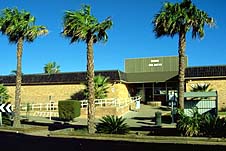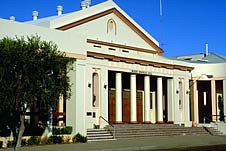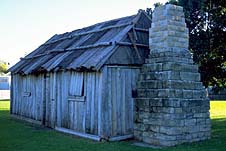
|
| Moree Artesian Spa Baths
|
Moree
Substantial town famed for its Artesian Spa which
attracts people seeking health-giving waters.
Moree (population 10 000) is located in northern NSW, 628 km
north-west of Sydney and 208 m above sea-level. It is the
major town in an affluent shire noted for its rich black
soil plains. As one local has remarked: 'You could put a
match in the ground overnight and get a walking stick in the
morning'. Wheat and other cereals, cotton, oil seeds, pecan
nuts and, most recently, olives, are all under cultivation.
Moree's location adjacent the Mehi River has meant it has
been flooded regularly over the years. It means that the
town has numerous attractive riverside parks and reserves.
Moree is also one of the largest farm machinery distribution
centres in the country.
Moree promotes itself as the 'Artesian Spa Capital'. The
town's hot artesian spa bath complex, which has evolved from
the Moree bore which was originally sunk to a depth of 850 m
in 1895 to obtain irrigation water. Baths were soon set up
(different days originally being allocated to the different
sexes) and the local council began promoting the waters as a
curative and a source of relaxation and replenishment - a
tradition still carried on today. The bore ceased to flow in
1957 and is now worked by a pump.
Before white settlement the area was occupied by the
Kamilaroi people whose descendants are still very much a
presence in the town. The first European known to have
visited the area was surveyor Thomas Mitchell in 1832. He
was sent to investigate the district by the acting governor
after the recapture of escaped convict George Clarke who
told of a great river called the Kindur. Clarke had been
living in the area to the south with the Kamilaroi from
1826-1831. Squatters soon followed in Mitchell's wake
establishing pastoral runs, among which was 'Moree' (1844),
from a Kamilaroi term thought to mean either 'long
waterhole' or 'rising sun'.
James and Mary Brand built a general store on the
townsite in 1852. A post office was added the following
year. The family sold up and moved to the Hunter Valley in
1857 but James died in 1858 leaving Mary with six children
so she returned and, failing to buy back the store, opened a
second in Bank St. In 1861 she opened the town's first inn.
Moree was gazetted in 1862 with land sales proceeding
that year. A court of petty sessions was established in 1863
although a flood submerged the town in 1864. The first
constable arrived and a police station was set up in 1865.
The first church (Wesleyan) was built in 1867.
As closer settlement proceeded agriculture emerged on the
fertile flood plains. Banking began in 1876 and the first
local newspaper was set up in 1881, at which time the
population was 295. The town became a municipality in 1890
and the railway arrived in 1897.
Wheat cultivation increased after World War II with a
flour mill built at Moree in 1951. The postwar years also
saw the displacement of many indigenous people who had lived
and worked on the land. Hence Moree has a large Aboriginal
population.
Cotton has become vital to the local economy since
cultivation began in the early 1960s and the first
commercial pecan nut farm was established on the Gwydir
River in 1966.
The Amaroo Drive Market is held on the first Sunday of
the month in Jellicoe Park. The Carnival of Sport is held at
Easter and the Golden Grain Festival in November.
Things to see:
![[Top of page]](smlArrow.gif)

|
| Moree Memorial Hall
|
Visitors' Centre
The Moree Tourist Information Centre is located at the
corner of the Newell and Gwydir Highways, tel: (02) 6757
3350. There are gifts and pecan nuts for sale. Enquiries can
be made here concerning scenic drives, the town's open
garden scheme, which operates on specified days in autumn
and spring, and tours of a cotton gin and cotton farm (from
April to August), of Lightning Ridge (March to November) or
of a pecan nut farm.
Adjacent the centre is the Lyle Houlahan Park where there
are picnic tables and childrens' play facilities.
Artesian Spa Baths
The mineral-rich water emerges at 41 degrees Celsius and is
pumped into the public pool complex via both underwater spa
jets and, for therapeutic and pleasurable effect, by
above-pool spouts. The pools are emptied and cleaned each
night. They are open on weekdays from 6.30 a.m. to 8.30
p.m., and from 7.00 a.m. to 7.00 p.m. on weekends and public
holidays. A masseur is always in attendance though bookings
are necessary, tel: (02) 6757 3450.
The complex is located at the corner of Anne and Gosport
Sts.
The Artesian Thermal Resort is a privately owned complex
with its own artesian pool, restaurant and therapy centre,
set in five acres of landscaped gardens, tel: (1800) 637
678.
Walking Track
The Barry Roberts Walk is a scenic trek along the
picturesque riverbanks of the town and the adjoining
bushland. It also takes in some of the town's heritage
sites. A guiding pamphlet is available from the visitors'
centre.
Heritage Buildings
Despite the wealth of the shire the architecture, with a few
exceptions, is functional and undistinguished. This may well
reflect the fact that the town, built on flood plains, has
been completely submerged on a number of occasions,
particularly in 1910 and 1955, and was partially destroyed
by fire in 1928.
However, there are a few buildings of note in Frome St.
The Edwardian-style Moree Club was originally the residence
and private practice of Dr McGill, who, in 1900, allegedly
became the first Australian motor car owner when he bought
his vehicle in Sydney and drove it to Moree. It is said that
he didn't like it and soon returned to horse-power.
The brick and stone courthouse with gambrel roofs, built
in 1903, has some venerable old jacaranda trees for shade.
At Frome and Heber is the Federation-style Lands Office
building (1894) with gambrel roofs and enormous verandahs
added in 1910. Award-winning restoration was carried out
after a 1980 fire. Note the Art Deco TAFE College. Opposite
is the Moree Plains Gallery, situated in a fine Edwardian
Baroque building (1920). The National Bank Building, on
Frome St, is also of some interest.
'Alloway' at 15 Gwydir St is a private residence built in
the late 1890s.
Moree Plains Gallery
The Moree Plains Gallery, at the corner of Heber and Frome
Sts, has an ever-changing display of artworks, though the
collection of Contemporary Aboriginal Art and Artefacts from
the Kamilaroi region is on permanent display. They are open
from 10.00 a.m. to 5.00 p.m. weekdays, from 10.00 a.m. to
2.00 p.m. Saturdays and from 11.00 a.m. to 2.00 p.m.
Sundays, tel (02) 6757 3320.
Amaroo DC3
At the Amaroo Tavern in Amaroo Drive is a well-maintained
DC3 aeroplane from World War II. You can inspect the
interior.

|
| The replica slab hut in
Mary Brand Park |
Mary Brand Park
Mary Brand Park, at the corner of Gwydir and Frome Sts, is
named after the woman who, along with her husband, opened a
store in 1852, which proved the beginning of the town. In
1861 she established the town's first inn on this very
corner. The park contains a replica slab hut and Meei
Cottage (reflecting the original spelling of the Mehi River)
which is typical of an 1890s residence. There are also some
rather old Moreton Bay fig trees.
Cemetery
On Greenbah Rd (the Gwydir Highway), at the western
outskirts of town, beyond the golf club, is a cemetery.
Perhaps the most famous grave is that of Charles Dickens'
youngest son, Edward Bulwer Lytton Dickens. It is located to
the left of the main gates. Young Dickens arrived in
Australia in 1868. His father died in 1870. He spent the
rest of his life in Australia becoming the mayor of
Wilcannia and working for the Lands Department in Moree from
1900 until his death in 1902.
Another headstone marks the tomb of Mary Brand who, along
with her husband, effectively founded the townsite in 1852
when she opened a store. In 1861 she established the first
inn. Her daughter, buried alongside, was the first white
child born in Moree. Kangaroos gather here at dusk, but
visitors are advised not to attempt feeding.
Weirs and Swimming Spots
There are three weirs around Moree which can be pinpointed
at the Moree Information Centre. Tareelaroi Weir, which has
picnic and barbecue facilities, is 20 km east via the Gwydir
Highway (take the signposted turnoff to the left).
Combadello Weir, a good fishing and bird watching spot, is
25 km west of town via the Gwydir Highway. Boolooroo Weir,
where there are barbecue facilities, is about 8 km north via
the Newell Highway (turn left just before Boolooroo Bridge).
The Rocks are a pleasant picnic and swimming spot. Head
north-east for 11 km along the Newell Highway then turn
right, heading east for 5 km to the end of the road.
Waa Gorge
Waa Gorge is 86 km south-east of Moree (including 20 km of
unsealed roads) at the northern tip of Mt Kaputar National
Park. The route is convoluted so be sure to pick up a
detailed guide available from the Moree Visitors' Centre.
From the end of the road a walking track leads past the
picnic area to the 'Devil's Waterholes', two deep waterholes
in which you can swim. Climb the small hill on their left
and follow the track alongside the creek. It is about 45
minutes to the gorge which appears as you round a corner,
towering 70 m overhead. The walls of the gorge are bright
orange.

Broadwalk
Business Brokers
Broadwalk Business
Brokers specialise in General Businesses for Sale, Caravan Parks for
Sale, Motels for Sale, Management Rights & Resorts for Sale, Farms for
Sale, Hotels for sale,Commercial & Industrial Properties for Sale.
Phone:
1300 136 559
Email:
enquiries@broadwalkbusinessbrokers.com.au
AUSTRALIAN BUSINESSES FOR SALE
COFFS HARBOUR BUSINESS BROKERS
BROADWALK BUSINESS BROKERS
GOLD COAST BUSINESSES FOR SALE
BRISBANE BUSINESSES FOR SALE
SYDNEY BUSINESSES FOR SALE
CARAVAN PARKS FOR SALE
BUSINESSES FOR SALE
MOTELS
FOR SALE
HOTELS
FOR SALE
Disclaimer
We advise prospective purchasers that we take no
responsibility for the accuracy of any information in the business
provided by vendors or their professional advisers and that they should
make their own enquiries as to the accuracy of this information,
including obtaining independent legal and/or accounting advice
Moree

